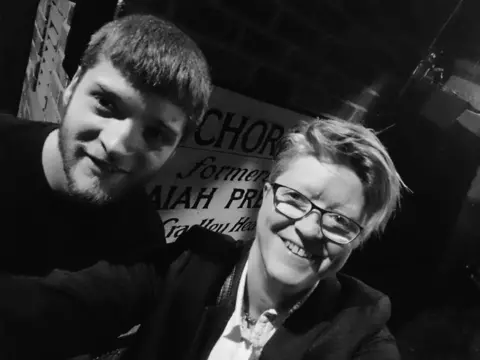The BBC article titled “My son could so easily have been another Nottingham killer” tells a poignant story of mental health failings and potential tragedies tied to the Nottingham attacks that occurred in 2023. The narrative revolves around the experiences of Shelly Easom, whose son, Josef Easom-Cooper, committed a shocking act of violence by stabbing a worshipper outside St. Stephen’s Church in Sneinton on Easter Sunday. This incident occurred within a larger context of violence in Nottingham, where multiple individuals suffering from severe mental health issues were involved in violent acts, raising serious concerns about the efficacy of mental health care services.
In 2023, Nottingham witnessed several violent incidents involving individuals diagnosed with paranoid schizophrenia, including Josef Easom-Cooper and Junior Dietlin, who stabbed several people. The article explains that all three individuals, including Valdo Calocane, the perpetrator of a fatal attack on June 13, were under the care of the Nottinghamshire Healthcare NHS Trust. Calocane’s attacks claimed the lives of three victims: Barnaby Webber, Grace O’Malley-Kumar, and Ian Coates.
These alarming incidents prompted scrutiny and criticism of the NHS trust’s handling of mental health services. Following the attacks, the trust issued an apology for not meeting the high standards of care, acknowledging the systemic failures that led to such tragedies. Families affected by the violence, including those of Calocane’s victims, have expressed their grievances, suggesting that better care could have possibly prevented these horrific outcomes.
The article recounts Shelly Easom’s own experiences with her son’s mental health struggles. She reflects on how, during his teenage years, she found dangerous objects in his room, indicating her son’s turbulent mental state. Despite her concerns communicated to mental health professionals, it wasn’t until Josef committed a knife attack that it became evident how dire his condition had become. Shelly reported feeling ashamed and horrified, particularly because she had anticipated such an incident due to her son’s ongoing struggles. Her descriptions of his decline underline what she perceives as a neglect of duty by the mental health system.
Easom-Cooper’s violent act did not occur in isolation; it prompted a broader conversation about the notorious lack of support for individuals dealing with severe mental health challenges, particularly those who, like Easom-Cooper, are let down by the system designed to protect them and society. The NHS Trust’s difficulty in managing patients’ transitions from institutional to community settings has been highlighted, with many families feeling helpless despite recognizing warning signs in their loved ones’ behavior. This sense of helplessness resonates throughout the community, highlighting the urgent need for reform in mental health services.
Furthermore, the article depicts the subsequent events involving Junior Dietlin, who also attacked multiple strangers in Nottingham, reflecting a disturbing pattern. The prosecution described Dietlin’s behavior as an “extraordinary case,” bringing attention to the urgent necessity for adequate risk assessment and management within community mental health frameworks. Dietlin’s actions, alongside Easom-Cooper’s, contributed to a distressing environment and showcased the consequences of inadequate mental health care.
This narrative culminates in calls from local families and advocates for improved engagement and a reformed system capable of preventing such tragedies from occurring. The trust has indicated a commitment to improving practices and policies, emphasizing the importance of family engagement in treatment plans.
In conclusion, the events in Nottingham serve as a glaring reminder of the frailties within mental health care systems and the vital need for proactive measures in managing and supporting individuals with severe mental health issues. The stories of Josef Easom-Cooper, Junior Dietlin, and Valdo Calocane underscore the profound impacts of mental illness on both individuals and society, calling for immediate action towards enhancing mental health services.



